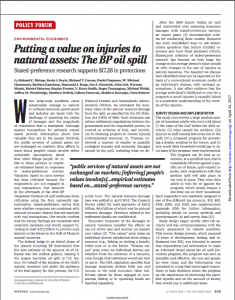Full Title: Putting a value on injuries to natural assets: The BP oil spill
Author(s): Richard C. Bishop, Kevin J. Boyle, Richard T. Carson, David Chapman, W. Michael Hanemann, Barbara Kanninen, Raymond J. Kopp, Jon A. Krosnick, John List, Norman Meade, Robert Paterson, Stanley Presser, V. Kerry Smith, Roger Tourangeau, Michael Welsh, Jeffrey M. Wooldridge, Matthew DeBell, Colleen Donovan, Matthew Konopka, Nora Scherer
Publisher(s): Science
Publication Date: April 1, 2017
Full Text: Download Resource
Description (excerpt):
When large-scale accidents cause catastrophic damage to natural or cultural resources, government and industry are faced with the challenge of assessing the extent of damages and the magnitude of restoration that is warranted. Although market transactions for privately owned assets provide information about how valuable they are to the people involved, the public services of natural assets are not exchanged on markets; thus, efforts to learn about people’s values involve either untestable assumptions about how other things people do relate to these services or empirical estimates based on responses to stated-preference surveys. Valuation based on such surveys has been criticized because the respondents are not engaged in real transactions. Our research in the aftermath of the 2010 BP Deepwater Horizon oil spill addresses these criticisms using the first, nationally representative, stated-preference survey that tests whether responses are consistent with rational economic choices that are expected with real transactions. Our results confirm that the survey findings are consistent with economic decisions and would support investing at least $17.2 billion to prevent such injuries in the future to the Gulf of Mexico’s natural resources.
